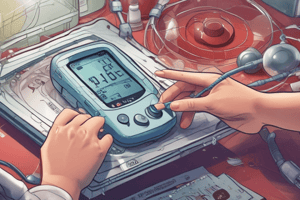Podcast
Questions and Answers
What is the primary aim of nutritional and metabolic support in critical illness?
What is the primary aim of nutritional and metabolic support in critical illness?
- To offset catabolism and optimize the patient's management (correct)
- To increase the sympathetic response to stress
- To promote oxidative stress and tissue damage
- To provide minimal nutritional intake to the patient
What is the role of antioxidants in nutritional support?
What is the role of antioxidants in nutritional support?
- To provide necessary nutrients and support (correct)
- To offset catabolism and optimize the patient's management
- To promote oxidative stress and tissue damage
- To increase the sympathetic response to stress
Why is it important to attenuate the increase in the sympathetic response to stress in septic shock patients?
Why is it important to attenuate the increase in the sympathetic response to stress in septic shock patients?
- To decrease gluconeogenesis and hyperglycemia (correct)
- To decrease the need for exogenous fat administration
- To increase the oxidative burden of the patient
- To promote tissue damage and oxidative stress
What is the consequence of providing too little feed to a patient?
What is the consequence of providing too little feed to a patient?
What is the consequence of providing too much feed to a patient?
What is the consequence of providing too much feed to a patient?
What is the primary goal of nutrition assessment?
What is the primary goal of nutrition assessment?
What is the underlying principle of providing nutrition in critical illness?
What is the underlying principle of providing nutrition in critical illness?
What is the relationship between the provision of nutrition and wound healing?
What is the relationship between the provision of nutrition and wound healing?
Flashcards are hidden until you start studying
Study Notes
Nutritional Support in Critical Illness
- Inadequate nutritional intake can lead to dysfunction, emphasizing the importance of providing necessary nutrients to offset catabolism and optimize patient management.
- The nutrition approach can be complex, requiring consideration of antioxidants, nutrients, and timing of administration to support the patient's response to stress and injury.
Balancing Nutritional Supply
- A delicate balance must be maintained in nutritional supply to avoid tissue damage, as too little feed can lead to energy reserve depletion, while too much feed can promote oxidative stress.
- Decisions on nutritional supply must be adjusted according to the patient's oxidative burden.
Nutrition Assessment
- Clinical decision making is essential for nutrition assessment, which involves evaluating the underlying disease, its severity, energy and nitrogenous needs, nutrient intake, malabsorption, and diseases of the alimentary tract.
Importance of Nutrition in Critical Illness
- Proper nutrition is crucial in maintaining the body's homeostasis and contributing to wound healing, whether surgically created or resulting from injury.
- Specific nutrients have distinct actions on the body's response to stress, and good nutritional support is associated with quicker resolution of organ dysfunction and better outcomes in critical illness.
Optimizing Nutrition in Shock States
- Optimal nutrition may moderate the physiological stress response following shock states, such as sepsis, and potentially prevent the onset of multiple organ dysfunction syndrome (MODS).
Studying That Suits You
Use AI to generate personalized quizzes and flashcards to suit your learning preferences.




